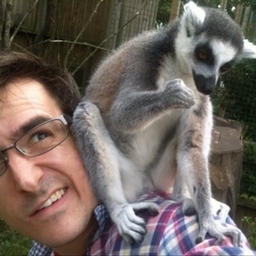
Lewis Dartnell
Author and Contributor at BusinessBrief
Contributor at BBC Sky at Night
Prof., astrobiology researcher, science communicator & book author (https://t.co/ldOXKhPLa6 / https://t.co/vQXhGug1XU / https://t.co/xCyGAT5qQM)
Articles
-
1 week ago |
linkiesta.it | Lewis Dartnell
Gli animali traggono molti vantaggi dal vivere in gruppo. Innanzitutto, rende molto più facile trovare un partner; permette di cacciare in branco con successo; offre la sicurezza del numero e la protezione dai predatori. Ma rispetto alle greggi di gnu o ai banchi di pesci, nelle società umane c’è molta più complessità. Abbiamo un’incredibile propensione a collaborare.
-
3 weeks ago |
skyatnightmagazine.com | Lewis Dartnell
The origin of Mars’s two moons, Phobos and Deimos, has long been a matter of debate. The idea that they are captured asteroids has been popular in the past, but they both orbit close to Mars’s equatorial plane. As a result, most planetary scientists accept it's more likely Mars's moons formed from a disc of rock and dust circling the planet. Such a circum-Martian disc was probably formed of ejecta from a giant impact into the Red Planet.
-
1 month ago |
skyatnightmagazine.com | Lewis Dartnell
The asteroid belt marks the boundary in our Solar system between the inner rocky planets and the outer gas giants. It's made up of large, irregular-shaped, rocky and metallic bodies called asteroids, or minor planets. It is the widest region of the Solar System between Mercury and Neptune that doesn't contain a major planet. One of many rings of the Solar System including the rings of Saturn and the Kuiper Belt, scientists are slowly revealing the secrets of the asteroid belt.
-
1 month ago |
skyatnightmagazine.com | Lewis Dartnell
The Search for Extraterrestrial Intelligence (SETI) is interested in finding alien civilisations by detecting signs of their activity. The use of radio telescopes to listen out for alien broadcasts dates back to the 1960s, but SETI researchers also look for evidence of enormous engineering projects. For example, an alien civilisation might construct a thin shell around its host star to harvest energy.
-
2 months ago |
skyatnightmagazine.com | Lewis Dartnell
Earth is often considered to be a water world: over 70% of our planet’s surface is covered in oceans. Since our planet orbits within what’s known as the ‘Goldilocks zone’ around the Sun, the warmth it receives is just right for keeping water in its liquid state. But there are several moons in the outer Solar System that are also known to hold significant bodies of liquid water. Could these ocean worlds in our Solar System be habitable worlds, where life might take hold?
Try JournoFinder For Free
Search and contact over 1M+ journalist profiles, browse 100M+ articles, and unlock powerful PR tools.
Start Your 7-Day Free Trial →X (formerly Twitter)
- Followers
- 9K
- Tweets
- 23K
- DMs Open
- Yes